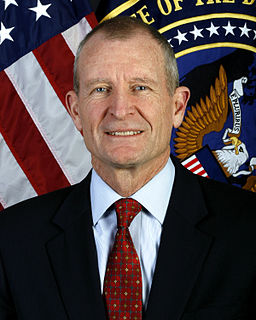A Quote by John O. Brennan
Al-Qa'ida does not follow a traditional command structure, wear uniforms, carry its arms openly, or mass its troops at the borders of the nations it attacks. Nonetheless, it possesses the demonstrated capability to strike with little notice and cause significant civilian or military casualties.
Related Quotes
Obviously, the death of Usama Bin Laden marked a strategic milestone in our effort to defeat al-Qa'ida. Unfortunately, Bin Laden's death, and the death and capture of many other al-Qa'ida leaders and operatives, does not mark the end of that terrorist organization or its efforts to attack the United States and other countries.
President Obama is determined that our foreign and national security policies not play into al-Qa'ida's strategy or its warped ideology. Al-Qa'ida seeks to terrorize us into retreating from the world stage. But President Obama has made it a priority to renew American leadership in the world, strengthening our alliances and deepening partnerships.
In full accordance with the law - and in order to prevent terrorist attacks on the United States and to save American lives - the United States government conducts targeted strikes against specific al-Qa'ida terrorists, sometimes using remotely piloted aircraft, often referred to publicly as drones.
"Peace" is a condition in which no civilian pays any attention to military casualties which do not achieve page-one, lead-story prominence-unless that civilian is a close relative of one of the casualties. But, if there ever was a time in history when "peace" meant that there was no fighting going on, I have been unable to find out about it.
The United States is at war with the al Qaeda terrorist group. Al Qaeda is not a nation-state and it has not signed the Geneva Conventions. It shows no desire to obey the laws of war; if anything it directly violates them by disguising themselves as civilians and attacking purely civilian targets to cause massive casualties.
What is and isn't justified by military necessity is, naturally, open to interpretation. One of the key concepts, though, is the law of proportionality. A military attack that results in civilian casualties - 'collateral damage' - is acceptable as long as the military benefits outweigh the price that is paid by humanity.


























